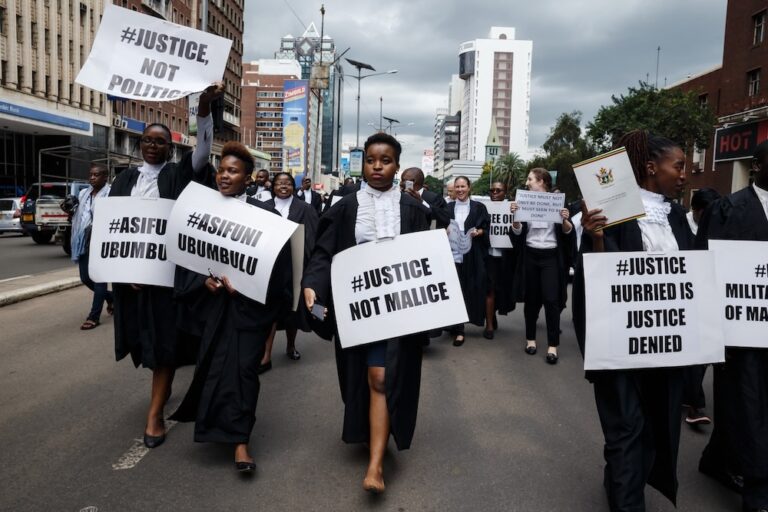(MISA/IFEX) – Three journalists were released on 2 May 2002. Lloyd Mudiwa, Collin Chiwanza and Andrew Meldrum were released after each being granted bail of US$36. On 2 May, Provincial Magistrate Lilian Kudya ordered the journalists’ release. On 3 May, Mudiwa and Chiwanza appeared in court for an initial remand. The Magistrates Court also heard […]
(MISA/IFEX) – Three journalists were released on 2 May 2002. Lloyd Mudiwa, Collin Chiwanza and Andrew Meldrum were released after each being granted bail of US$36.
On 2 May, Provincial Magistrate Lilian Kudya ordered the journalists’ release. On 3 May, Mudiwa and Chiwanza appeared in court for an initial remand. The Magistrates Court also heard an application by Meldrum’s lawyer, Beatrice Mtetwa of Kantor and Immerman, to have the court dismiss the allegations against her client. Mtetwa sought a refusal of remand, arguing that there was no reasonable suspicion that her client had committed an offence. She also said that the “London Guardian” newspaper, for which the state alleges Meldrum writes, does not exist.
The three journalists were arrested on allegations of having written a false story in which it was reported that a supporter of the opposition party had been hacked to death by ruling party militants. They were charged under Section 80 of the Access to Information and Protection of Privacy Act for allegedly abusing journalistic privilege by writing falsehoods.
Mtetwa rebuked police officers for denying the journalists access to their lawyers. She went on to say that the section under which her client was charged infringes on the Bill of Rights, as provided for in the Zimbabwean constitution. She has since asked that the magistrate refer the matter to the Supreme Court for determination. “This section is unconstitutional. The section referred to is unreasonable and places unnecessary restrictions on the practice of journalism,” Mtetwa said.
She also complained about the selective application of the law by the state and said she would produce evidence to the court of complaints to the police of falsehoods published in a local daily. The police have not investigated the complaints, she told the court. Mtetwa said the Access to Information and Protection of Privacy Act was being used to persecute journalists from the private media.
In response, senior public prosecutor Thabani Mpofu said that the act did not infringe on anyone’s rights but was there to deal with those who published falsehoods. Mpofu called Mtetwa’s application “frivolous and vexatious.”
Background Information
The arrests of journalists Mudiwa, Chiwanza and Meldrum followed the publishing of an article on 23 April in which “The Daily News” reported that two young girls had witnessed the beheading of their mother by alleged Zimbabwe African National Union Patriotic Front (ZANU-PF) supporters in the rural area of Magunje.
In a front-page story on 27 April, “The Daily News” apologised to the ruling ZANU-PF party and to the government after it was revealed that the husband of the victim might have misled the paper.
Zimbabwe’s Minister of Information and Publicity Jonathan Moyo has since warned government-run companies against advertising in “The Daily News”, which he alleges has created a reputation of peddling lies.


